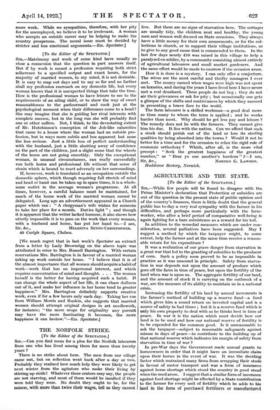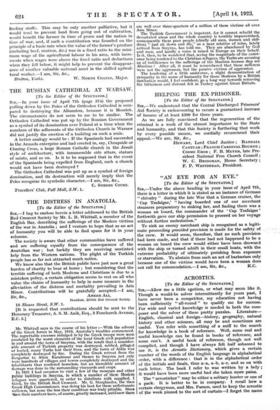AGRICULTURE AND THE STATE.
[To the Editor of the SPECTATOR.] SIR,—While few people will be found to disagree with the Prime Minister's declaration that Protection or subsidies are out of the question in the present state of public opinion and of the country's finances, there is little doubt that the general public has to-day a very real sympathy with the farmer in his difficulties, and perhaps more particularly with the farm- worker, who after a brief period of comparative well-being is again fighting for a bare subsistence as a reward for his toil.
In addition to the remedial measures which are under con- sideration, several palliatives have been suggested. May I suggest a method by which the taxpayer might, to some extent, help the farmer and at the same time receive a reason- able return for his expenditure ?
It was a realization of our grave danger from starvation m a great war that led to the granting of subsidies to the producer of corn. Such a policy soon proved to be as impossible in practice as it was unsound in principle. Safety from starva- tion in war depends not upon the amount of produce which goes off the farm in time of peace, but upon the fertility of the land when war is upon us. The aggregate fertility of our land, and the amount of stock it is carrying on the outbreak of a war, are the measure of its ability to maintain us in a national crisis.
Increasing the fertility of his land by annual increments is the farmer's method of building up a reserve fund—a fund which gives him a sound return on invested capital and is a source of safety in bad times ; but it is a reserve fund which is only his own property to deal with as he thinks best in time of peace. In war it is the nation which must decide how our land is to be used and how our national reserve of fertility is to be expended for the common good. Is it unreasonable to ask the taxpayer—subject to reasonable safeguards against misuse in days of peace—to contribute to the building up of that national reserve which indicates his margin of safety from starvation in time of war ?
In pre-War days the Government made annual grants to homeowners in order that it might have an immediate claim upon their horses in the event of war. It was the deciding factor which restrained many firms from scrapping their studs in favour of motor transport and was a form of insurance against horse shortage which stood the country in good stead when the need arose. I suggest that a similar form of insurance against food shortage might be effected by a State contribution to the farmer for every unit of fertility which he adds to his
land in the form of purchased fertilizers or manufactured
feeding stuffs. This may be only another palliative, but it would tend to prevent land from going out of cultivation, would benefit the farmer in time of peace and the nation in time of war, and, if such a contribution was founded on the principle of a basic rate when the value of the farmer's produce (including beef, mutton, &c.) was in a fixed ratio to the mini- mum wage of the agricultural labour in his area, with incre- ments when wages were above the fixed ratio and deductions when they fell below, it might help to prevent the disappear-. ance of another valuable national asset in the skilled agricul- tural worker.—I am, Sir, Sze.,
Brotton, Yorks. W. NORTH COATES, Major.











































 Previous page
Previous page